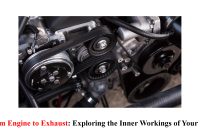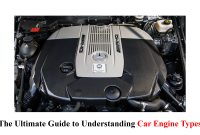
Owning a car is more than just having a convenient mode of transportation. It’s about the freedom to explore, the thrill of the open road, and the sense of independence that comes with it. But being a responsible car owner goes beyond simply filling up your tank and hitting the gas pedal. To truly make the most out of your vehicle and ensure its longevity, there are five essential things every car owner should know. From regular maintenance to understanding warning signs, and basic repairs to finding the right mechanic, and even avoiding common insurance mistakes – this blog post will cover it all! So buckle up and get ready for an informative ride through the top tips for being an informed and empowered car owner!
The Importance of Regular Car Maintenance
Regular car maintenance is the key to keeping your vehicle in tip-top shape. It’s like giving your car a well-deserved spa day, minus the cucumbers on its eyes! But why is it so important? Well, think of it this way: you wouldn’t skip a check-up with your doctor, right? Just like our bodies need regular care and attention, so do our cars.
First and foremost, regular maintenance helps prevent breakdowns and costly repairs down the line. By staying on top of things like oil changes, tire rotations, and brake inspections, you can catch potential issues before they become major headaches. Plus, taking care of your car now means it will likely have a longer lifespan – saving you money in the long run!
Another benefit of regular maintenance is improved fuel efficiency. When your car’s engine is running smoothly and all systems are functioning properly, it doesn’t have to work as hard to get you from point A to point B. This means less gas consumption and fewer emissions – good for both your wallet and the environment!
Understanding Your Car’s Manual and Warning Signs
Your car’s manual may seem like a daunting read, with its technical jargon and diagrams that appear to be written in another language. However, taking the time to understand your car’s manual can save you from costly repairs down the line.
Familiarize yourself with the different warning signs on your dashboard. These indicators provide valuable information about potential issues with your vehicle. From low tire pressure to engine problems, these warning lights are not something to ignore or dismiss.
Next, spend some time reading through the sections of your car’s manual that pertain to maintenance schedules and recommended service intervals. This will help you stay on top of regular servicing tasks such as oil changes and filter replacements.
Additionally, understanding your car’s manual allows you to troubleshoot minor issues on your own. It provides step-by-step instructions for basic repairs like changing a flat tire or jump-starting a dead battery.
By gaining knowledge about your vehicle through its manual, you empower yourself as a responsible car owner. You become better equipped to identify potential problems early on and take appropriate action before they escalate into major repairs that could drain both your wallet and time.
Remember: when it comes to understanding your car’s manual and recognizing warning signs, knowledge is power!
Basic DIY Car Repairs Every Owner Should Know
When it comes to owning a car, you’ll inevitably encounter some maintenance issues along the way. While it’s always important to have a trusted mechanic on hand for major repairs, there are certain basic DIY car repairs that every owner should know. Not only will this save you time and money, but it can also give you a sense of empowerment knowing that you can handle minor fixes on your own.
One of the most common DIY car repairs is changing the oil. Regularly changing your oil is crucial for maintaining the longevity and performance of your vehicle. It’s a relatively simple process that involves draining out the old oil and replacing it with fresh oil.
Another essential skill every car owner should possess is how to change a flat tire. There’s nothing worse than being stranded on the side of the road with no spare tire or knowledge of how to replace it. By learning this basic repair, you’ll be back on the road in no time.
In addition to these two repairs, knowing how to jump-start a dead battery is another valuable skill. Whether due to leaving lights on or extreme weather conditions draining your battery, being able to revive it can save you from having to call for assistance.
Furthermore, understanding how to replace windshield wipers is an often overlooked but necessary repair skill. Over time, wiper blades wear out and become less effective at clearing away rain or debris from your windshield. Knowing when and how to replace them ensures optimal visibility during inclement weather.
Familiarizing yourself with basic electrical troubleshooting can help diagnose and fix minor issues related to headlights, taillights, or interior lights not working properly.
By investing some time into learning these basic DIY car repair skills, you’ll not only feel more confident about handling small maintenance tasks yourself but also potentially save money by avoiding unnecessary trips to the mechanic for minor fixes
How to Choose the Right Mechanic for Your Car
Finding the right mechanic for your car is crucial in ensuring its proper maintenance and longevity. With so many options out there, it can be overwhelming to choose the best one. Here are some tips to help you select the right mechanic:
1. Do your research: Start by asking friends, family, and colleagues for recommendations. Read online reviews and check ratings of local mechanics. Look for certifications and affiliations with professional organizations.
2. Check their expertise: Different mechanics specialize in different types of vehicles or specific repairs. Make sure the mechanic you choose has experience working on cars similar to yours.
3. Consider location: It’s convenient to have a mechanic located near your home or workplace, especially when dealing with unexpected breakdowns or routine servicing.
4. Get estimates: Don’t hesitate to ask for written estimates from multiple mechanics before making a decision. This will give you an idea of what each one charges for labor and parts.
5. Trust your instincts: Pay attention to how the mechanic communicates with you and if they take the time to answer all your questions patiently. A trustworthy mechanic will prioritize transparency and customer satisfaction.
Remember that finding a reliable mechanic may take some time and effort, but it’s worth it in the long run as it ensures that your car receives quality care from someone you can trust!
Common Car Insurance Mistakes and How to Avoid Them
When it comes to car insurance, many car owners make common mistakes that can end up costing them in the long run. To ensure you have the right coverage and avoid unnecessary expenses, it’s important to be aware of these mistakes and know how to avoid them.
One common mistake is not shopping around for different insurance quotes. Many car owners simply renew their policies without taking the time to compare rates from other providers. By doing so, they may miss out on potential savings or better coverage options.
Another mistake is not understanding your policy thoroughly. It’s crucial to read through your policy documents carefully and ask any questions you may have before signing on the dotted line. This will help you understand what is covered, what isn’t, and any limitations or exclusions that may apply.
Failing to disclose accurate information when applying for car insurance is another costly mistake. Providing incorrect details about your driving history or vehicle can result in denied claims or even cancellation of your policy if discovered later on.
It’s also essential not to overlook discounts that may be available to you. Many insurers offer various discounts based on factors such as safe driving records, multiple policies with the same company, or even being a member of certain organizations. Taking advantage of these discounts can significantly reduce your premiums.
Neglecting regular reviews of your coverage needs can lead to overpaying for unnecessary add-ons or inadequate protection. As life circumstances change, so do our insurance needs. It’s wise to reassess your coverage annually and make adjustments accordingly.
By avoiding these common car insurance mistakes and staying proactive in managing your coverage, you’ll ensure peace of mind while saving money along the way!
Conclusion
Being a car owner comes with a great responsibility. Regular car maintenance, understanding your car’s manual and warning signs, basic DIY repairs, choosing the right mechanic, and avoiding common insurance mistakes are all crucial aspects of owning a vehicle.
By prioritizing regular maintenance tasks such as oil changes, tire rotations, and checking fluid levels, you can ensure that your car remains in optimal condition for years to come. Understanding your car’s manual and paying attention to warning signs will help you address issues promptly and prevent further damage.
Equipping yourself with some basic DIY repair knowledge can save you time and money when dealing with minor issues like changing bulbs or replacing wiper blades. However, it is essential to know when to seek professional assistance for more complex problems.
Choosing the right mechanic is vital for maintaining the long-term health of your vehicle. Look for certified technicians who have experience working on cars similar to yours. Don’t hesitate to ask for recommendations from friends or family members who have had positive experiences with their mechanics.
Avoid making common insurance mistakes by thoroughly researching different policies before making a decision. Make sure you understand what is included in each policy option and choose one that suits your needs best.
As a responsible car owner, taking these steps will not only keep your vehicle running smoothly but also provide peace of mind knowing that you are well-prepared in case any unexpected situations arise.
Remember: being proactive about maintaining your car now can help prevent costly repairs down the line. So take care of your investment by staying informed and regularly attending to its needs – both big and small!
And there you have it – the top five things every car owner should know! With this knowledge at hand, you’ll be ready to tackle whatever challenges may come up during ownership while keeping yourself safe on the road.



Leave a Reply